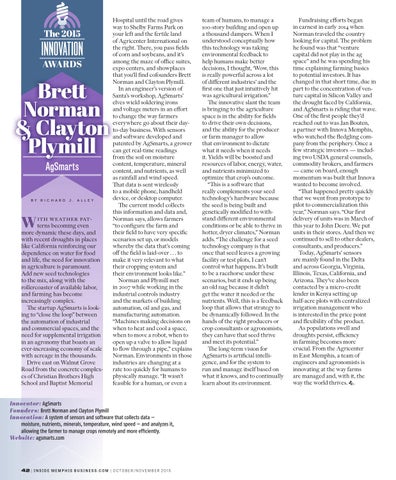Brett Norman & Clayton Plymill AgSmarts ••• BY RICHARD J. ALLEY
W
ith weather patterns becoming even more dynamic these days, and with recent droughts in places like California reinforcing our dependence on water for food and life, the need for innovation in agriculture is paramount. Add new seed technologies to the mix, along with the rollercoaster of available labor, and farming has become increasingly complex. The startup AgSmarts is looking to “close the loop” between the automation of industrial and commercial spaces, and the need for supplemental irrigation in an agronomy that boasts an ever-increasing economy of scale with acreage in the thousands. Drive east on Walnut Grove Road from the concrete complexes of Christian Brothers High School and Baptist Memorial
Hospital until the road gives way to Shelby Farms Park on your left and the fertile land of Agricenter International on the right. There, you pass fields of corn and soybeans, and it’s among the maze of office suites, expo centers, and showplaces that you’ll find cofounders Brett Norman and Clayton Plymill. In an engineer’s version of Santa’s workshop, AgSmarts’ elves wield soldering irons and voltage meters in an effort to change the way farmers everywhere go about their dayto-day business. With sensors and software developed and patented by AgSmarts, a grower can get real-time readings from the soil on moisture content, temperature, mineral content, and nutrients, as well as rainfall and wind speed. That data is sent wirelessly to a mobile phone, handheld device, or desktop computer. The current model collects this information and data and, Norman says, allows farmers “to configure the farm and their field to have very specific scenarios set up, or models whereby the data that’s coming off the field is laid-over . . . to make it very relevant to what their cropping system and their environment looks like.” Norman and Plymill met in 2007 while working in the industrial controls industry and the markets of building automation, oil and gas, and manufacturing automation. “Machines making decisions on when to heat and cool a space, when to move a robot, when to open up a valve to allow liquid to flow through a pipe,” explains Norman. Environments in those industries are changing at a rate too quickly for humans to physically manage. “It wasn’t feasible for a human, or even a
team of humans, to manage a 100-story building and open up a thousand dampers. When I understood conceptually how this technology was taking environmental feedback to help humans make better decisions, I thought, ‘Wow, this is really powerful across a lot of different industries’ and the first one that just intuitively hit was agricultural irrigation.” The innovative slant the team is bringing to the agriculture space is in the ability for fields to drive their own decisions, and the ability for the producer or farm manager to allow that environment to dictate what it needs when it needs it. Yields will be boosted and resources of labor, energy, water, and nutrients minimized to optimize that crop’s outcome. “This is a software that really complements your seed technology’s hardware because the seed is being built and genetically modified to withstand different environmental conditions or be able to thrive in hotter, dryer climates,” Norman adds. “The challenge for a seed technology company is that once that seed leaves a growing facility or test plots, I can’t control what happens. It’s built to be a racehorse under these scenarios, but it ends up being an old nag because it didn’t get the water it needed or the nutrients. Well, this is a feedback loop that allows that strategy to be dynamically followed. In the hands of the right producers or crop consultants or agronomists, they can have that seed thrive and meet its potential.” The long-term vision for AgSmarts is artificial intelligence, and for the system to run and manage itself based on what it knows, and to continually learn about its environment.
Fundraising efforts began in earnest in early 2014 when Norman traveled the country looking for capital. The problem he found was that “venture capital did not play in the ag space” and he was spending his time explaining farming basics to potential investors. It has changed in that short time, due in part to the concentration of venture capital in Silicon Valley and the drought faced by California, and AgSmarts is riding that wave. One of the first people they’d reached out to was Jan Bouten, a partner with Innova Memphis, who watched the fledgling company from the periphery. Once a few strategic investors — including two USDA general counsels, commodity brokers, and farmers — came on board, enough momentum was built that Innova wanted to become involved. “That happened pretty quickly that we went from prototype to pilot to commercialization this year,” Norman says. “Our first delivery of units was in March of this year to John Deere. We put units in their stores. And then we continued to sell to other dealers, consultants, and producers.” Today, AgSmarts’ sensors are mainly found in the Delta and across Georgia, Virginia, Illinois, Texas, California, and Arizona. They’ve also been contacted by a micro-credit lender in Kenya setting up half-acre plots with centralized irrigation management who is interested in the price point and flexibility of the product. As populations swell and droughts persist, efficiency in farming becomes more crucial. From the Agricenter in East Memphis, a team of engineers and agronomists is innovating at the way farms are managed and, with it, the way the world thrives. ,
Innovator: AgSmarts Founders: Brett Norman and Clayton Plymill Innovation: A system of sensors and software that collects data — moisture, nutrients, minerals, temperature, wind speed — and analyzes it, allowing the farmer to manage crops remotely and more efficiently. Website: agsmarts.com
42 |
INSIDE MEMPHIS BUSINESS.COM | OCTOBER /NOVEMBER 2015
034_2015_IMB10-11_INNOVATIONS-v2.indd 42
9/9/15 4:10 PM
